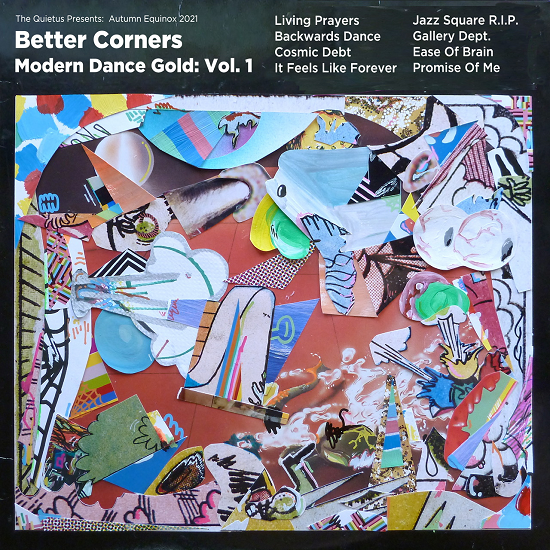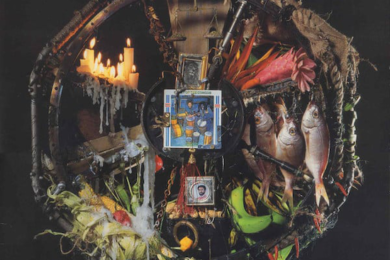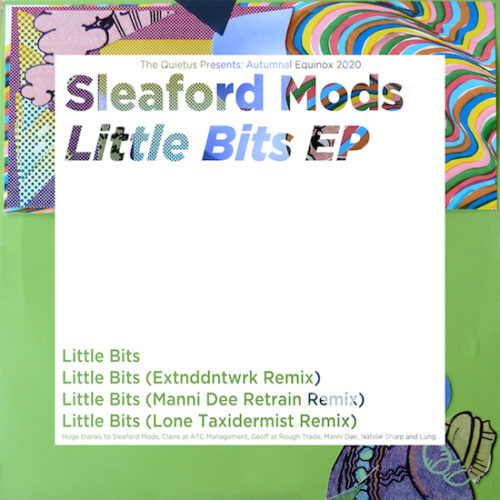Each of the three musicians who make up Better Corners, whose debut album Modern Dance Gold: Vol. 1 is out today as tQ’s Autumn Equinox release exclusive to our Sound & Vision tier subscribers, have already established themselves among the outliers of modern leftfield music. Valentina Magaletti’s long list of projects is as dizzyingly eclectic as it is consistently brilliant – from the shimmering experimental pop of Vanishing Twin to high-profile collaborations and performances with the likes of Irmin Schmidt, Gruff Rhys, Thurston Moore and Bat For Lashes, she is one of the most acclaimed drummers and composers of her generation. As well as touring with Kim Gordon, forming half of noisy art-rock duo Talk Normal and one third of the live ‘band/self-improvement project’ War Bubble, Sarah Register has mastered and worked as an engineer on dozens of huge records, from Grammy-nominated records by Lee ‘Scratch’ Perry and David Bowie to alternative favourites by the likes of Protomartyr, Horse Lords, Future Islands and Big Thief. Since Matthew Simms joined Wire in 2010, he’s been one of the driving forces behind that band’s consistently astounding modern output, to say nothing of his boundary-pushing experimental organ project Slows, his part in Wire/Minutemen supergroup FITTED, or his dream-pop outfit It Hugs Back.
With such prolific careers, the three members of Better Corners had inevitably crossed paths in recent years. A decade ago, Register’s Talk Normal opened for Simms’ band on a run of shows. “It was a treat to see Wire everyday, and we kept in touch in the years since,” she recalls as tQ gets the trio together on Zoom. Magaletti did the same with Tomaga, the acclaimed experimental duo she formed with the late Tom Relleen, in 2013 – although she’d met Simms previously at a Krautrock Karaoke night in an East London pub. “I still remember the smell of that day,” she jokes. She and Simms also played together as part of the deliriously powerful UUUU (along with Wire’s Graham Lewis and experimental heavyweight Thighpaulsandra). In March, Simms and Magaletti were talking about starting a new project. Simms and Register, too, had often floated the idea of collaborating. “We’d discussed doing something for ages, but didn’t manage to figure it out until Valentina. Maybe she was the missing link,” he says. Eventually, says Magaletti, the inevitable happened. “I received a message from Matt saying, ‘I’d love to do a band with you and this woman Sarah Register.’ It was a funny coincidence. Me and Sarah were already in touch anyway because she knew Tomaga. So, we ended up in this fruitful remote collaboration.”
Though Magaletti and Register are yet to meet in real life, things ran smoothly from the off. Simms had high hopes for the collaboration. “It felt like even before we’d done anything, something good would happen. My expectations were high, but it exceeded them,” he says. “From moment one it just kind of worked,” adds Register. “It could totally not have worked, but there was no preciousness. The entertainment value was high from the start.”
After a few weeks of discussion, about a month later Register “had all this guilt about leaving them hanging, not showing up for these amazing collaborators.” She sent over some piano tracks she’d recorded in a California woodland, and they started going back and forth. “It would elevate each time, like the three of us ping-ponging on a circular table.” They’d run this, and other small pieces of music through modular synthesisers, adding hypnotic rhythms and beats and flourishes of guitar, drone, flute and more; at points, they joked about recording “An impenetrable modular Bon Jovi cover.” Before long, sent back and forth between the US and Europe, these little snippets had blossomed and bloomed into glorious, expansive songs. Those woodland piano recordings that started it all, for example, can now be heard on the album’s staggering ten-minute centrepiece ‘It Feels Like Forever’, plinking ominously amid a foreboding drone that’s peppered with industrial clatters and ghostly warped vocals, and then gives way to a jaw-dropping, thunderous stampede of drums.

The rest of the record is no less stunning. On ‘Backwards Dance’, they skitter between the organic and the artificial, oblique, detached chants and fizzling electronic squalls lent dark momentum by a relentless, pummelling drum beat. On ‘Cosmic Debt’, the music teeters on the edge of collapse as it descends into discordant scratches and tumbling piano. On closer ‘Promise Of Me’ they approach the sublime, as gorgeous sprawls of feedback are cut through with a slow and glorious guitar riff, beautiful in its simplicity. They embraced the realities of remote collaborating, finding beauty in the disparate and the fragmented. Simms explains, “From a practical point of view, a lot of the recording was done in little bits, from the piano in the woods recorded on a phone, to more hi-fi stuff. The way that impacts the record I really like. It makes it more unusual.”
Better Corners’ sound is as remarkable as you’d expect from the calibre of its constituent musicians. All three are notable not just for their experience, but a relentlessly forward-thinking spirit – a tendency to avoid laurel-resting in search of bold creative turns with each new project. It shows on Modern Dance Gold: Vol. 1 a record that abounds with flourishes of texture and constant twists of direction, yet never falters for a second in its momentum. The respective skills of each member are present, “Someone I’ve known for a long time described it as sounding a bit like the best of all of us,” notes Simms, but ultimately they present a united front. “I can kind of hear that, but we’re all multitudes,” says Register. “When I listen to it, I can’t remember what’s Matt and what’s me, there’s a gorgeous blur of things. It’s really beautiful to me.”
It’s not to be understated just how impressive it is that Better Corners, who recorded entirely remotely, have produced such a cohesively atmospheric album. Magaletti puts it down to a lack of pressure. “There’s not a modus operandi at all. There wasn’t any thought like ‘Someone’s got to write lyrics.’ At the start, for instance, we didn’t know that Sarah’s a professional flute player; we still hadn’t discovered ourselves in full.” This explorative instinct, always so present in their respective projects, combined well with the fact that, as Magaletti continues, “I like to think we’ve got our shit together as adults, and as musicians, so we don’t need to prove anything. I don’t think there’s egos, I don’t think we’re precious about anything, it’s whatever makes everyone happy.” Register agrees. “I never felt like I had to edit anything I thought or said. And there’s deservedness here in what [Valentina and Matt] have created in their lives, and what I’ve created in mine. I didn’t have a thing to prove here, and yet a million things were proved to me.”
Still, by any metric, Better Corners was a breeze to work on. “I felt that it continued to be miraculous,” Register puts it. “I’m struggling to think of anything any of us sent that was rejected. There was a shocking amount of symbiosis and satisfaction.” There was no pressure for each to remain in any kind of niche. “It wasn’t like ‘Valentina only plays percussion, Matt only plays modular’, it was an opportunity for exploration in a way that was really useful.” It’s a spirit reflected in the album’s artwork, partly a tribute to Atlantic Records’ vivid early-60s jazz and R&B covers. “It’s collagey, colourful and playful, which have been themes throughout,” says Register.
What’s most exciting of all is that Better Corners are only just getting started; this is only Vol. 1 after all. Already, the band have close to another album’s worth of material ready for release. “It’s just starting to shape up, and you never know where it’s going to end up, which is part of the fun,” says Magaletti. Pandemic permitting, live shows are on the agenda too. Just how the three musicians would sound when playing together in person can’t yet be predicted. Their debut album is in many ways the sound of disparate remote-working transformed into something transcendent that blurs the boundaries between its collaborators. “Face to face, the frequency is more electric,” Magaletti continues. One thing is for certain, however; even among the three musicians’ extensive catalogue of extraordinary collaborations, Better Corners are something special. “I’m very promiscuous with music, I play with so many people,” Magaletti concludes. “I was telling my agent about Better Corners today and she was like, ‘What? Another fucking album?!’ But I know from day one if there’s nothing to say. You have to worship the other people and what they put in.”
To receive the new album by Better Corners, as well as a host of other benefits including exclusive essays, podcasts and playlists, and loads more specially-comissioned music, become a Quietus Sound & Vision subscriber. You can do so here






